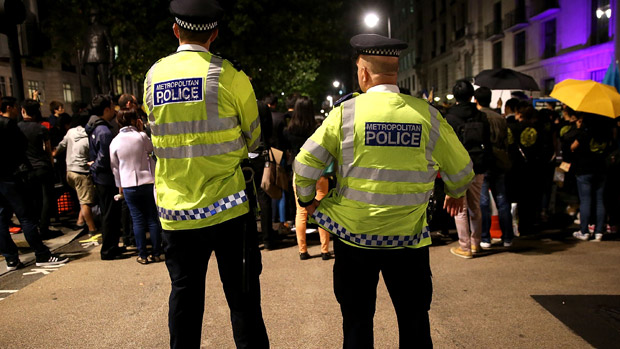Half of police forces failing to seek out officer corruption
Corruption not endemic, says police watchdog, but forces must be more proactive in seeking it out

A free daily email with the biggest news stories of the day – and the best features from TheWeek.com
You are now subscribed
Your newsletter sign-up was successful
Corruption is not endemic in the police service of England and Wales, but many forces lack the capability to proactively seek out corrupt officers, the police watchdog has said.
Her Majesty's Inspectorate of Constabulary (HMIC) said police forces have the necessary capability to deal with most corruption when it is brought to their attention, through public complaints for example, but only half of forces are seeking out intelligence on corruption proactively.
A report from the watchdog found that the "overwhelming majority of officers and staff are honest and professional" but noted that cases of corruption within policing can have a "disproportionate effect on public confidence".
The Week
Escape your echo chamber. Get the facts behind the news, plus analysis from multiple perspectives.

Sign up for The Week's Free Newsletters
From our morning news briefing to a weekly Good News Newsletter, get the best of The Week delivered directly to your inbox.
From our morning news briefing to a weekly Good News Newsletter, get the best of The Week delivered directly to your inbox.
Out of 4,580 internal investigations into officers and staff in the 2013/14 financial year, more than 60 per cent resulted in "no further action". The remainder ended in disciplinary actions or the accused retiring or resigning.
There were 134 dismissals, representing around 0.07 per cent of police officers and staff in England and Wales. Wrongdoing included drug-related offences, theft, sexual misconduct, information disclosure, "relationships with the media" and racial discrimination.
HMIC wants forces to gather and analyse intelligence on their own officers and staff to identify trends or risks of corruption before the problem "manifests itself more fully". This would include analysis of business interests, gifts and hospitality, although the BBC's Danny Shaw points out that some officers are currently refusing to accept anything from members of the public – including cups of tea – for fear of being accused of corruption. "The report, rightly, says that's going too far," says Shaw.
The report found that only a third of forces showed a detailed understanding of the current and emerging corruption threats they faced.
A free daily email with the biggest news stories of the day – and the best features from TheWeek.com
Chief Constable Jacqui Cheer, national policing lead on police standards and ethics, said: "Corruption is neither endemic nor widespread in the police service. However, the actions of a few corrupt officers can corrode the reputation of the vast majority who work hard every day to protect the public. We will continue to improve our approach so that those who are not fit to be in the police are held to account and removed."
-
 Local elections 2026: where are they and who is expected to win?
Local elections 2026: where are they and who is expected to win?The Explainer Labour is braced for heavy losses and U-turn on postponing some council elections hasn’t helped the party’s prospects
-
 6 of the world’s most accessible destinations
6 of the world’s most accessible destinationsThe Week Recommends Experience all of Berlin, Singapore and Sydney
-
 How the FCC’s ‘equal time’ rule works
How the FCC’s ‘equal time’ rule worksIn the Spotlight The law is at the heart of the Colbert-CBS conflict
-
 Home Office worker accused of spiking mistress’s drink with abortion drug
Home Office worker accused of spiking mistress’s drink with abortion drugSpeed Read Darren Burke had failed to convince his girlfriend to terminate pregnancy
-
 In hock to Moscow: exploring Germany’s woeful energy policy
In hock to Moscow: exploring Germany’s woeful energy policySpeed Read Don’t expect Berlin to wean itself off Russian gas any time soon
-
 Were Covid restrictions dropped too soon?
Were Covid restrictions dropped too soon?Speed Read ‘Living with Covid’ is already proving problematic – just look at the travel chaos this week
-
 Inclusive Britain: a new strategy for tackling racism in the UK
Inclusive Britain: a new strategy for tackling racism in the UKSpeed Read Government has revealed action plan setting out 74 steps that ministers will take
-
 Sandy Hook families vs. Remington: a small victory over the gunmakers
Sandy Hook families vs. Remington: a small victory over the gunmakersSpeed Read Last week the families settled a lawsuit for $73m against the manufacturer
-
 Farmers vs. walkers: the battle over ‘Britain’s green and pleasant land’
Farmers vs. walkers: the battle over ‘Britain’s green and pleasant land’Speed Read Updated Countryside Code tells farmers: ‘be nice, say hello, share the space’
-
 Motherhood: why are we putting it off?
Motherhood: why are we putting it off?Speed Read Stats show around 50% of women in England and Wales now don’t have children by 30
-
 Anti-Semitism in America: a case of double standards?
Anti-Semitism in America: a case of double standards?Speed Read Officials were strikingly reluctant to link Texas synagogue attack to anti-Semitism